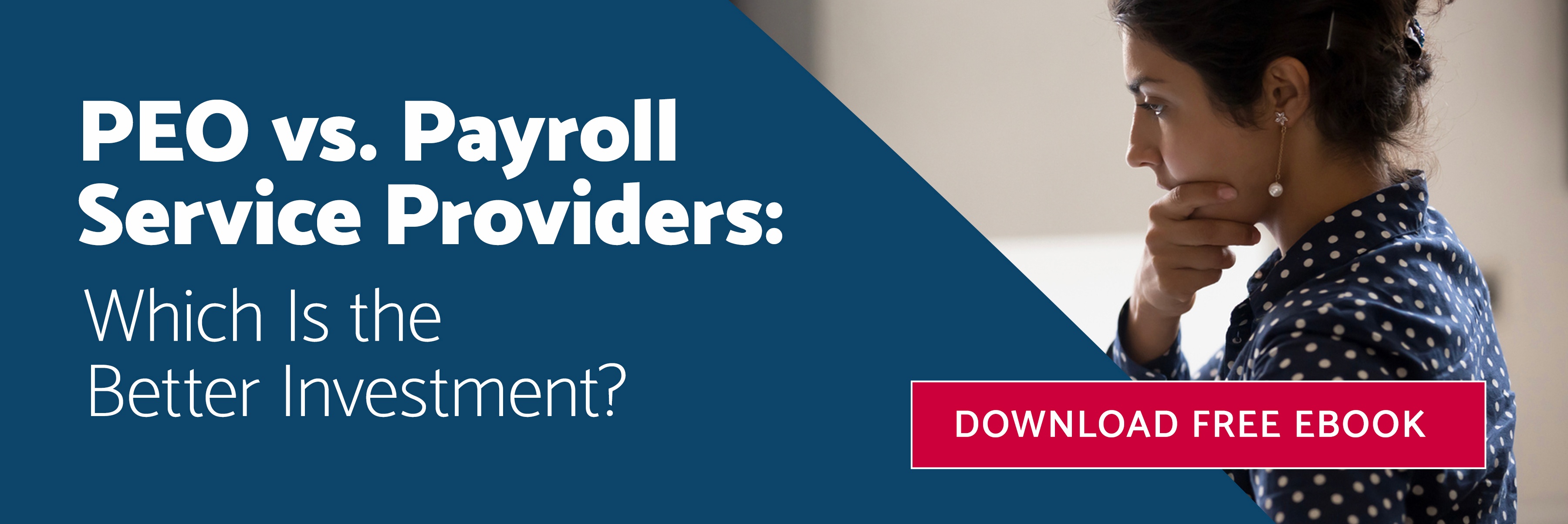OneSource Business Solutions Blog
What Does The Perfect HR Solution Look Like?

For small companies whose HR "team" is one person, HR can be a nightmare.
Not having a proper human resources department can result in HR duties being taken on by employees who are simply not trained or prepared to do so. This takes people away from revenue-generating activities, results in increased mistakes (82% of employees who take on HR functions in small businesses have no formal HR training), and wastes money.
Yet, these companies simply cannot afford to increase the size of their HR team. So, what would the perfect solution accomplish?
Help HR Do Their Job
When you do have a one-person HR department, you don't want to replace them. They have, or are developing, the intimate knowledge of your company needed to handle higher level and strategic tasks.
Instead, what you want to do is supplement them by removing routine administrative burdens such as payroll and benefits administration. These tedious but essential tasks require a lot of meticulous focus and knowledge of compliance. However, they don't need a detailed knowledge of exactly how your company works and how your staff fit together.
When the outsourcing partner takes these particular tasks on, your HR team can start working on strategic matters. For example, they can look for employees for your current postings who can be trained and developed to move up internally as your company grows. In a time when certain skills are in high demand, this can help you get around a skills shortage five years down the line.
Lower Costs
An ideal solution would also reduce your costs. This does not just mean the opportunity cost of having non-HR employees wasting their time on HR paperwork but reducing the cost of benefits, especially health insurance. Even better would be to lower the cost of workers' compensation. These costs can be prohibitive for very small companies, stifling growth and preventing you from offering the competitive benefits needed to attract top talent.
Reducing HR costs means you have more money to spend on your core business and can treat your employees better without wasting a lot of money just trying to meet the minimum on benefits.
Ensure Compliance
One of the biggest problems trying to do HR with a small team or personnel with other primary responsibilities is keeping up with federal, state, and local regulations. Following all the rules and knowing when they change is a full-time job, but you can't afford to actually have somebody do that. You need a solution that will give you that expertise for a lower cost.
This can become particularly tricky if you have remote employees in multiple states (in some cases, employees have moved without telling their employer). Offering mobility to your employees can help attract talent, but it can make compliance even harder and make it even more important to have access to a compliance specialist.
Decrease Turnover
One of HR's primary responsibilities is to keep all of your employees satisfied. Unhappy employees are less productive, take more time off, and ultimately will head for greener pastures.
High turnover costs you money in hiring costs (About $4,000 for each new employee), and also results in an inability to develop institutional memory and the solid company culture you need to make your company a great place to work. It can easily become a vicious cycle of people are unhappy, so they leave, so people are unhappy.
Additionally, good benefits reduce turnover. Employees may leave a company they like simply because the benefits no longer meet their needs.
Finally, high turnover can torpedo strategic planning. If your goal is to promote internally, then you need to have your employees willing to stick around and potentially take those opportunities. It's vital to seek an HR solution that is not only well-received by employers and management, but by employees.
Positive ROI
Finally, your HR solution needs to have a positive ROI. Payroll-only solutions seldom provide a good ROI (in fact, it can even be negative, as it essentially takes away only the opportunity cost of having some in-house employee spend hours on paperwork). More comprehensive services generally do better in this regard. You can design an outsourcing solution with your partner that fits your precise needs and continue to adjust it as your company grows.
All of these things come together to mean one thing: professional employer organizations. Partnering with a PEO gives you an average ROI of 27.2%. Much of this comes from the ability to enroll your employees in their master benefits plan, gaining significant economies of scale. Partnering with a PEO means you are outsourcing all of your routine HR matters, from payroll solutions to things like employee background checks and dealing with unemployment hearings.
This leaves your HR team free to deal with the issues for which you truly need their expertise. They can focus on making your company a great place to work, attracting top talent, and building a culture of growth.
By partnering with a PEO, you can find the perfect HR solution that will not only serve your needs now, but grow with your company. This HR solution gives you an excellent ROI and frees your HR personnel to do the job you hired them to do, which is help grow your company.
Recent Posts
Posts by Topic
- HR Outsourcing (37)
- Employee Benefits (14)
- Payroll & HR Administration (5)
- Strategic Planning & Research (5)
- Company Culture (4)
- HR Compliance (4)
- Industry – Professional Services (4)
- PEO (4)
- Workers’ Comp (4)
- Employee Turnover (3)
- OneSource PEO Company News (3)
- performance management (2)
- Navigating COVID-19 (1)
- manufacturing industry (1)
